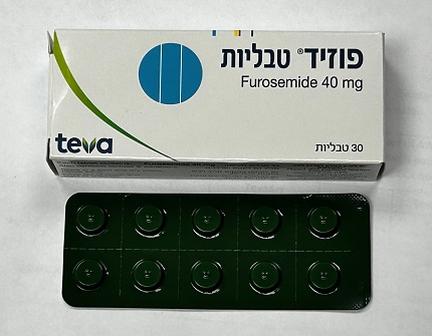Quest for the right Drug

פוזיד טבליות FUSID TABLETS (FUROSEMIDE)
תרופה במרשם
תרופה בסל
נרקוטיקה
ציטוטוקסיקה
צורת מתן:
פומי : PER OS
צורת מינון:
טבליה : TABLETS
עלון לרופא
מינוניםPosology התוויות
Indications תופעות לוואי
Adverse reactions התוויות נגד
Contraindications אינטראקציות
Interactions מינון יתר
Overdose הריון/הנקה
Pregnancy & Lactation אוכלוסיות מיוחדות
Special populations תכונות פרמקולוגיות
Pharmacological properties מידע רוקחי
Pharmaceutical particulars אזהרת שימוש
Special Warning עלון לרופא
Physicians Leaflet
Adverse reactions : תופעות לוואי
4.8. Undesirable effects Very common (≥1/10); common (≥1/100 to <1/10); uncommon (≥1/1,000 to <1/100); rare (≥1/10,000 to <1/1,000); very rare (<1/10,000); Frequency not known (cannot be estimated from the available data). Blood and lymphatic Uncommon: aplastic anaemia system disorders: Rare: bone marrow depression (necessitates withdrawal of treatment), eosinophilia, leucopenia. Very rare: haemolytic anaemia, agranulocytosis, thrombocytopenia Metabolism and Very common: dehydration, hyponatraemia, hypochloremic metabolic alkalosis, nutritional disorders: hypocalcaemia, hypomagnesemia (incidences of the last three are reduced by triamterene) Common: Hypovolaemia, hypochloraemia Uncommon: impaired glucose tolerance (by hypokalaemia) hyperuricaemia, gout, reduction of serum HDL- cholesterol, elevation of serum LDL-cholesterol, elevation of serum triglycerides, hyperglycaemia Very rare: tetany Frequency not aggravated pre-existing metabolic alkalosis (in decompensated known: cirrhosis of the liver), fluid and electrolyte disturbances, excretion of potassium increased* Psychiatric disorder: Rare: psychiatric disorder NOC Nervous system Rare: paraesthesia, confusion, headache disorders: dizziness, fainting and loss of consciousness (caused by Not known: symptomatic hypotension) Eye disorders: Uncommon: visual disturbance, blurred vision, yellow vision. Ear and labyrinth Uncommon: deafness (sometimes irreversible) disorders: Rare: tinnitus and reversible or irreversible loss of hearing (although usually transitory, particularly in patients with renal failure, hypoproteinaemia (e.g. in nephritic syndrome)) Cardiac disorders: Uncommon: orthostatic intolerance, cardiac arrhythmias, increased risk or persistence of patent ductus arteriosus in premature infants. Vascular disorders: Very common: hypotension, (which, if pronounced may cause signs and symptoms such as impairment of concentration and reactions, light-headedness, sensations of pressure in the head, headache, drowsiness, weakness, disorders of vision, dry mouth, orthostatic intolerance). Rare: vasculitis, thrombosis, shock Gastrointestinal Uncommon: dry mouth, thirst, nausea, bowel motility disturbances, vomiting, disorders: diarrhoea, constipation Rare: acute pancreatitis (in long-term diuretic treatment, including furosemide). Hepatobiliary disorders: Rare: pure intrahepatic cholestasis (jaundice), hepatic function abnormal. Skin and subcutaneous Rare: rash, pruritus, photosensitivity, toxic epidermal necrolysis. tissue disorders: Frequency not urticaria, erythema multiforme, purpura, exfoliative dermatitis, known: itching, allergic reactions, such as skin rashes, various forms of dermatitis including urticaria, bullous lesions, acute generalised exanthematous pustulosis (AGEP). When these occur treatment should be withdrawn, Stevens- Johnson syndrome. Musculoskeletal and Uncommon: muscle cramps, muscle weakness. connective tissue disorders: Renal and urinary Very common: nephrocalcinosis in infants disorders: Uncommon: reduced diuresis, urinary incontinence, urinary obstruction (in patients with hyperplasia of the prostate, bladder inability to empty, urethral stricture unspecified). Rare: acute renal failure. Very rare: interstitial nephritis Congenital, familial and Rare: patent ductus arteriosus genetic disorders: General disorders and Uncommon: Fatigue administration site Rare: malaise, fever, severe anaphylactoid or anaphylactic reactions conditions: (e.g. with shock). Investigations: Common: creatinine increased, blood urea increased Rare: Transaminases increased, blood * Potassium deficiency manifests itself in neuromuscular symptoms (muscular weakness, paralysis), intestinal symptoms (vomiting, constipation, meterorism), renal symptoms (polyuria) or cardiac symptoms. Severe potassium depletion can result in paralytic ileus or confusion, which can result in coma. Reporting of suspected adverse reactions Reporting suspected adverse reactions after authorisation of the medicinal product is important. It allows continued monitoring of the benefit/risk balance of the medicinal product. Any suspected adverse events should be reported to the Ministry of Health according to the National Regulation by using an online form: https://sideeffects.health.gov.il

שימוש לפי פנקס קופ''ח כללית 1994
Congestive heart failure, acute pulmonary edema, cirrhosis with ascites, hypertension, nephrotic syndrome, hypercalcemia
תאריך הכללה מקורי בסל
01/01/1995
הגבלות
תרופה שאושרה לשימוש כללי בקופ'ח
מידע נוסף
